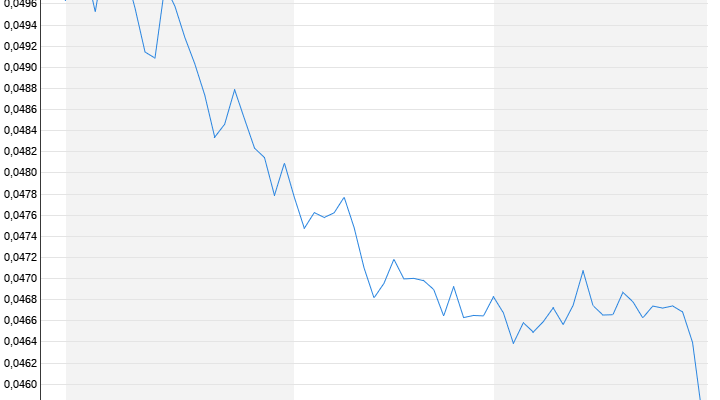After Erdogan’s re-election
The Turkish economy is now going further downhill
By Christina Lohner
5/30/2023 6:34 p.m
Turkey is in a severe economic crisis. The further term of President Erdogan is likely to exacerbate this. This also applies to German companies.
The Istanbul Stock Exchange rallied after President Recep Tayyip Erdogan’s re-election, but the Turkish lira fell to a record low. There is no end in sight to the serious economic crisis in Turkey after the elections, on the contrary: it is likely to get worse. “The Turkish government will have to make corrections,” says Klaus-Jürgen Gern, head of international economic forecasting at the Kiel Institute for the World Economy (IfW), in an interview with ntv.de. “It won’t work without raising interest rates, otherwise the inflationary spiral will continue.” The problem: Such a course correction is not in sight. Therefore, the uncertainty will not decrease as necessary, but will actually increase, predicts Gern.
The economist only expects Erdogan to change course when there is a new critical situation on the financial markets, which could lead to a balance of payments crisis. Until then, the downward spiral is likely to continue. Due to the devaluation of the lira, imports into Turkey are becoming more and more expensive – which also fuels inflation. Last year, this was at times more than 85 percent; According to official figures, it is currently still around 44 percent, but independent estimates come to significantly higher values. The main reason is that the central bank is fulfilling Erdogan’s wish for low interest rates despite high inflation – contrary to economic doctrine. And the extremely low interest rates mean that the lira continues to lose value.
It is true that not all sectors are suffering from the high inflation, some are even gaining, for example the tourism sector: The fact that holidays in Turkey are becoming cheaper and cheaper due to the weak lira means that bookings continue to rise. The German Travel Association can imagine that the record for German vacationers in Turkey will be broken again this year, as it reported on ntv.de’s request. Turkish export sectors such as mechanical engineering or the automotive industry also benefit from a weak lira because their products become cheaper on the world market. On the other hand, according to Gern, Turkey is heavily dependent on imports, for example for further processing. As a result, exporting companies have to raise prices to maintain profit margins, and it becomes a problem when there is a lack of foreign exchange needed for imports, Gern explains.
Instability scares off German investors
“The current high level of economic uncertainty makes the country unattractive for investors,” says Gern. Also for those from abroad, not least Germany. German companies from the automotive and textile industries, among others, produce in Turkey. “Turkey has been one of the most important procurement countries worldwide for German fashion manufacturers for many years,” the fashion association GermanFashion informs ntv.de. Foreign investors are looking for a stable environment. According to Gern, they are deterred by the instability and the threat of the economic crisis in Turkey escalating. “The planned intensification of economic relations is in question,” says the scientist.
The German companies that export to Turkey have to prepare for falling demand. On the one hand, there is sometimes a lack of foreign currency in Turkey, and on the other hand, the high inflation is increasingly causing problems for the Turkish middle class, which means that demand for consumer goods is falling. German cars, for example, are very popular with well-off households, as Gern reports – for the time being. Machines made in Germany have also been in demand in Turkey so far, they make up the largest share of imports from Germany.
With around eight percent of all Turkish exports, Germany is Turkey’s most important customer country. The country gets most of its imports from Russia, mainly because large volumes of Russian gas and oil are imported.
USA and EU put pressure on exports to Russia
The supply of means of production is still working, says Gern. Turkish industry is defying the crisis, according to the economist it has recently even grown again and exports have increased. Because the demand from Russia for Turkish products has increased significantly since the start of the Russian war of aggression against Ukraine. In part, this is likely to be a diversion of trade, but Turkey has also taken over production for Russia in part.
But that could soon be over. The pressure from the more important trading partners USA and EU is increasing. The Turkish government has already tightened the rules, according to which goods that are on a Turkish sanctions list should no longer be delivered to Russia. Bypass deliveries of production parts from the West, for example, which Russian industry cannot produce itself, but also exports of machines or cars from Turkey should come to an end. It also contains some production parts from Europe, as Gern explains.
In addition, the economist sees another risk for the Turkish economy. While the number of well-trained scientists and engineers has risen steadily over three decades, according to a recent study it has stagnated since 2015 and is currently even declining slightly. Because they do not agree with Turkey’s socio-political orientation and are therefore leaving their homeland. For example, those who study abroad are more likely to stay there than they used to be. “The more Erdogan tightens his socio-political course, the bigger this problem is likely to get,” says Gern. “That would then also noticeably impede the growth of the Turkish economy at some point.”

